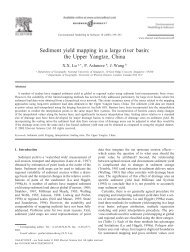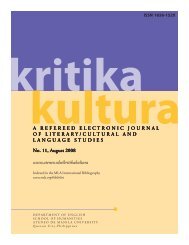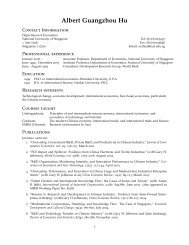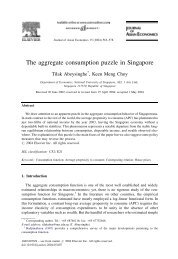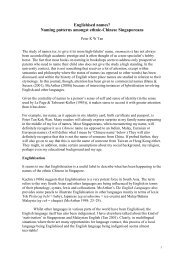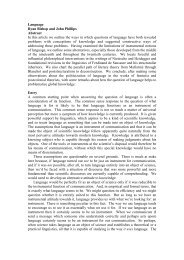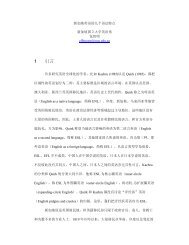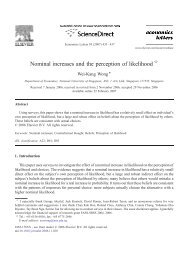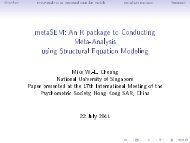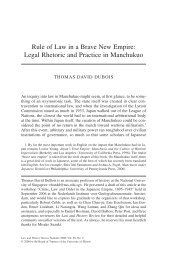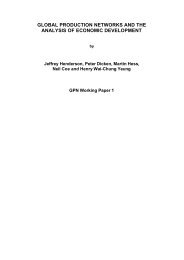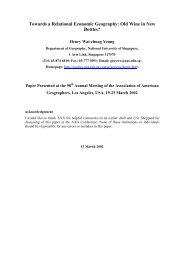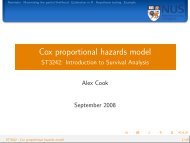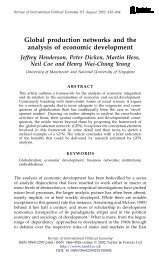Researching Hybridity in Social and Economic ... - NUS Home
Researching Hybridity in Social and Economic ... - NUS Home
Researching Hybridity in Social and Economic ... - NUS Home
You also want an ePaper? Increase the reach of your titles
YUMPU automatically turns print PDFs into web optimized ePapers that Google loves.
to drop our esteemed claim to truth <strong>and</strong> to beg<strong>in</strong> to work on “local knowledges”. By local<br />
knowledges, I mean highly contextualized underst<strong>and</strong><strong>in</strong>g of patterns <strong>and</strong> processes <strong>in</strong><br />
particular geographical sett<strong>in</strong>gs. These local knowledges might just come from ord<strong>in</strong>ary<br />
people rather than academics. Th<strong>in</strong>k of how often we focus our research on the so-called<br />
“paradigmatic examples” at the expense of the ord<strong>in</strong>ary? It is patently obvious that the<br />
ord<strong>in</strong>ary will always outnumber the paradigmatic <strong>in</strong> any empirical situation. To accomplish<br />
this m<strong>in</strong>dset change, we need an economic geography that is more forgiv<strong>in</strong>g <strong>in</strong> its theoretical<br />
<strong>and</strong> methodological embraces <strong>and</strong>, yet, less driven by fads <strong>and</strong> new found excitements that<br />
appear to be extraord<strong>in</strong>ary <strong>and</strong> paradigmatic – just like how culture appears to expla<strong>in</strong> the<br />
spirit of Ch<strong>in</strong>ese capitalism.<br />
Notes<br />
1<br />
For a representative sample of such “culturalist” works, see Redd<strong>in</strong>g (1990), Kotk<strong>in</strong> (1992),<br />
Kao (1993), East Asia Analytical Unit (1995), Weidenbaum <strong>and</strong> Hughes (1996), Haley et al.,<br />
(1998), Hefner (1998), <strong>and</strong> Chen (2001).<br />
2<br />
This was also the historical period dur<strong>in</strong>g which much of the economic success <strong>in</strong> East <strong>and</strong><br />
Southeast Asia was celebrated as the so-alleged “East Asian miracle” (World Bank, 1993).<br />
3<br />
Interest<strong>in</strong>gly, my recent book on Ch<strong>in</strong>ese capitalism <strong>in</strong> a global era (Yeung, 2004a) was<br />
covered by Tim LeeMaster as a top story entitled “Traditional bus<strong>in</strong>ess merges with global<br />
reality” for The St<strong>and</strong>ard, a major Hong Kong-based newspaper for the Greater Ch<strong>in</strong>a<br />
bus<strong>in</strong>ess community<br />
(http://www.thest<strong>and</strong>ard.com.hk/news_detail_frame.cfm?articleid=48047&<strong>in</strong>tcatid=2,<br />
accessed on 5 November 2004). My view on the hybridization of Ch<strong>in</strong>ese capitalism is<br />
apparently mak<strong>in</strong>g its way to reach the very research subjects themselves aga<strong>in</strong>.<br />
4<br />
Here, I must acknowledge specifically the positive role of Kris Olds, my long-time friend<br />
<strong>and</strong> research collaborator, <strong>in</strong> this transformation <strong>in</strong> my approach to Ch<strong>in</strong>ese capitalism. Our<br />
jo<strong>in</strong>t research <strong>in</strong>to globalization <strong>and</strong> Ch<strong>in</strong>ese capitalism dur<strong>in</strong>g the late 1990s brought me out<br />
of the “cultural essentialism” trap.<br />
5<br />
A similar literature on family secrets exists <strong>in</strong> the sociological literature (see Vangelisti <strong>and</strong><br />
Caughl<strong>in</strong>, 1997; Berardo, 1998).<br />
6<br />
See Yeung (2003) for more detail discussion on different types of triangulation <strong>in</strong> research<br />
practice.<br />
27



